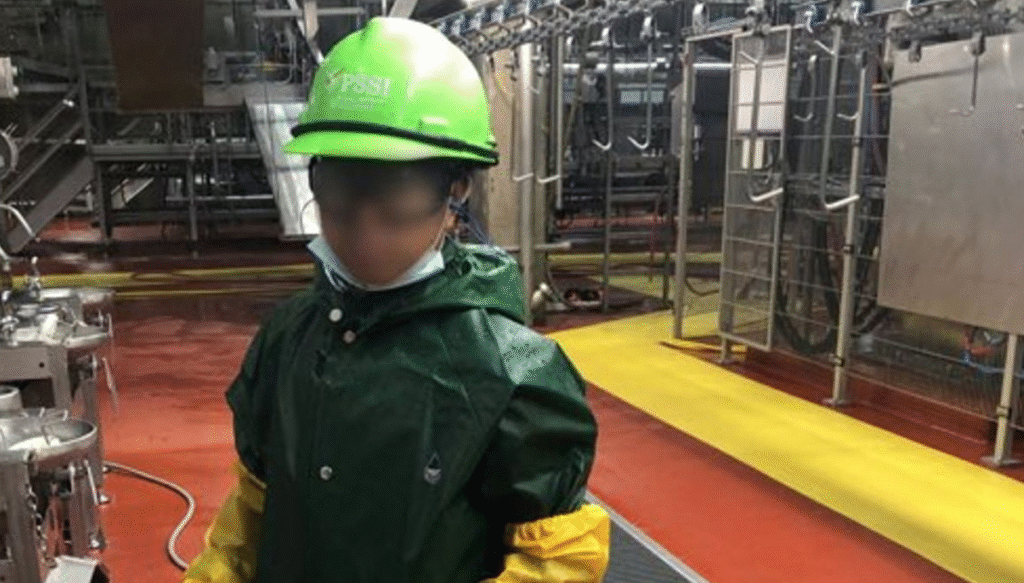UPDATED ON JUNE 17, 2025: Trump doubles-back and continues ICE raids in the agricultural sector.
On June 13, 2025, Brazilian meat giant JBS quietly slipped onto the New York Stock Exchange under the ticker JBSAY, fulfilling its long-sought ambition to tap American capital. The listings went smoothly enough—or as smoothly as a firm steeped in child‑labor deals, trafficking allegations, bribery scandals, and Amazon deforestation controversies can manage. Behind the polished investor deck and glossy sustainability pitch was the lasting stain of a child‑labor settlement that many hoped would be BURIED. Instead, it’s barely begun.
Turning a blind eye, but with checks – not balances
Just a day after the listing, whispers turned to headlines: President Trump ordered ICE to halt mass raids at meatpacking plants, farms, hotels, and restaurants—effectively greenlighting undocumented labor in essential sectors. There were sighs of relief from lobbyists and cattlemen, but the question remains: if undocumented workers can be reclaimed as “needed” one day after mass arrests, why were migrant children being punished yesterday?

In January 2025, the Department of Labor quietly forced JBS and Perdue to pay restitution for employing children as young as 13 in dangerous, overnight sanitation jobs inside slaughterhouses. JBS dropped $4 million, funneled through the nonprofit KIND, pledging audits, hotlines, and a no‑child‑labor policy for contractors. But as trucks roll into the processing plants with undocumented hands onboard, where are the real, measurable audits? On what authority will the company enforce zero‑tolerance against the very practices its subcontractors exploited?
A double standard in enforcement
Picture this: on one hand, doors open for undocumented—or “illegal”—workers. On the other, staffing firms are shut down for employing teenagers. There’s no shortage of headlines: federal agents—until yesterday—raiding plants where migrant children might slip through contractor checks. Now, with ICE standing down at meatpacking plants, all the illegal labor in the world looks more like corporate expedience than criminal offense.
If staffing firms were malfeasant enough to drive JBS and Perdue to settlement dollars, what exactly has changed, overnight? Are these “workers of convenience” to be subjected to random audits by sanitized compliance protocols while school‑age kids are tucked into DOL remediation programs funded by the same companies? Are we now distinguishing between the useful undocumented worker and the unwanted undocumented teen in this narrative?
JBS: Debits, credits, and political cover
JBS’s NYSE debut was not just a market event—it was a geopolitical play.
The company’s U.S. arm notably surprised Wall Street by writing a $5 million check to Donald Trump’s inaugural committee—one of Trump’s largest corporate donations. It raised eyebrows in Congress. Senator Warren publicly asked: “Was this a gift, or a ticket through the back door of SEC approval?” If access to U.S. financial markets demands a down payment on inauguration swag, is that better than paying off BNDES ministers to underwrite global acquisitions, as JBS admitted under the FCPA? Maybe. But both are routes best cleared when the press isn’t watching.
Now, with Trump in the Oval Office signaling leniency for “good” undocumented workers and JBS’s shares trading freely, America’s justice apparatus has a curious “selective hand”: It punishes dairy contractors who hire kids—and cuts regulatory slack for meatpackers who prefer undocumented adults.
And what about the kids?

It’s been six months since JBS pledged to safeguard children. The company claims to have fired noncompliant contractors, launched audits, and installed tip‑lines—but who is measuring it independently? KIND is supposed to distribute reparations and track community impact. Meanwhile, JBS is celebrating with U.S. stock market access, presumably to help fund its ESG agenda—though critics argue that’s largely PR repackaging.
Questions remain: Could a renewed ICE crackdown derail operations next month? Undocumented adults are now welcomed to fill meatpacking lines—while teens caught on the same floors cost companies fines and bad press. JBS got its shiny NYSE debut, but federal policy seems eager to hire undocumented workers even as it punishes child labor. Now JBS must prove its “zero‑tolerance” claims aren’t just PR—because if not, this is just another case of business as usual while vulnerable workers keep shouldering the cost.
Looking for transparency in food production? At BeefMaps.com, the only children you’ll find working on family farms are sons, daughters, and trusted neighbors—never undocumented or migrant youth. See who’s behind your beef supply chain and support farms committed to honest, local labor.





0 Comments